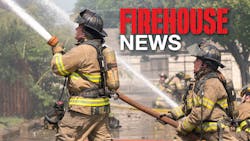The National Fire Incident Reporting System (NFIRS) will be replaced in the near future with a secure, cloud-hosted platform.
The U.S. Fire Administration and the U.S. Department of Homeland Security’s Science and Technology Directorate announced recently they are collaborating to develop a new, interoperable fire information and analytics platform.
The National Emergency Response Information System (NERIS) will empower the local fire and emergency services community by equipping them with near real-time information and analytic tools that support data informed decision-making for enhanced preparedness and response to incidents involving all hazards, according to a media advisory.
This migration will occur over several years to support a smooth transition, officials noted.
“Once launched, the new NERIS platform will provide capabilities for documenting and introducing community risk reduction efforts, associated resilience and mitigation efforts into the overall preparedness and resilience equation, providing greater insights into vulnerability gaps where resources can be used to harden communities and minimize future emergency and disaster events,” USFA Administrator Lori Moore-Merrell said in a statement.
Officials explained that there is a major gap between the current/legacy NFIRS system and the requirements for a new, modern platform that will readily inform community emergency response capacity and capability for day-to-day incidents and for large-scale disasters. Due to the limitations with the current legacy system, the quantity, quality and timeliness of NFIRS data submitted by states and local fire departments is inadequate.
The current, antiquated system is built on outdated code that is not interoperable with modern systems and is subsequently unable to integrate critical data and provide the insights on the national fire problem that USFA is charged by law to provide.
The platform will integrate data from multiple federal data sets, computer-aided dispatch (CAD) and other authoritative live-data sources to inform community risks including vulnerable populations, the wildland urban interface, drought areas and flood plains. Further, it will support rapid data capture from hostile event response, including response to structure fires, EMS incidents and hazardous materials events.
NFIRS will remain operational throughout the transition process so all fire and emergency services departments should continue to use the current NFIRS data system and maintain status quo until migrated to the new platform.
This project is made possible through a research and development contract awarded through S&T's Long-Range Broad Agency Announcement program awarded to the Fire Safety Research Institute (FSRI). FSRI is a part of UL Research Institutes, the nonprofit safety science organization within the UL enterprise. In collaboration with USFA, DHS S&T and the American fire service, FSRI will develop and provide the new NERIS platform for use by fire and emergency services departments nationwide.
The USFA's National Fire Data Center's obligation under the Federal Fire Prevention and Control Act of 1974 (Public Law 93-498) is to mitigate the fire problem, reduce loss of life and property, and educate the public on fire prevention and protection, as well as effects of all hazards.
NERIS will have enhanced data integration capability and substantial computing power to minimize the burden for data contributors, while providing incentives through user-defined and actionable analytic tools that support intelligence-led decision-making at the local level. It will support rapid integration and analysis of data from a multitude of sources.
It will be flexible and adaptable to the changing needs of the local fire service and first responders nationwide to ensure equity of service availability at the most local level, and to enable local fire departments and emergency response agencies to access and use their own data for data-driven informed decisions.
About the Author
Firehouse.com News
Content curated and written by Firehouse editorial staff, including Susan Nicol, Peter Matthews, Ryan Baker and Rich Dzierwa.
